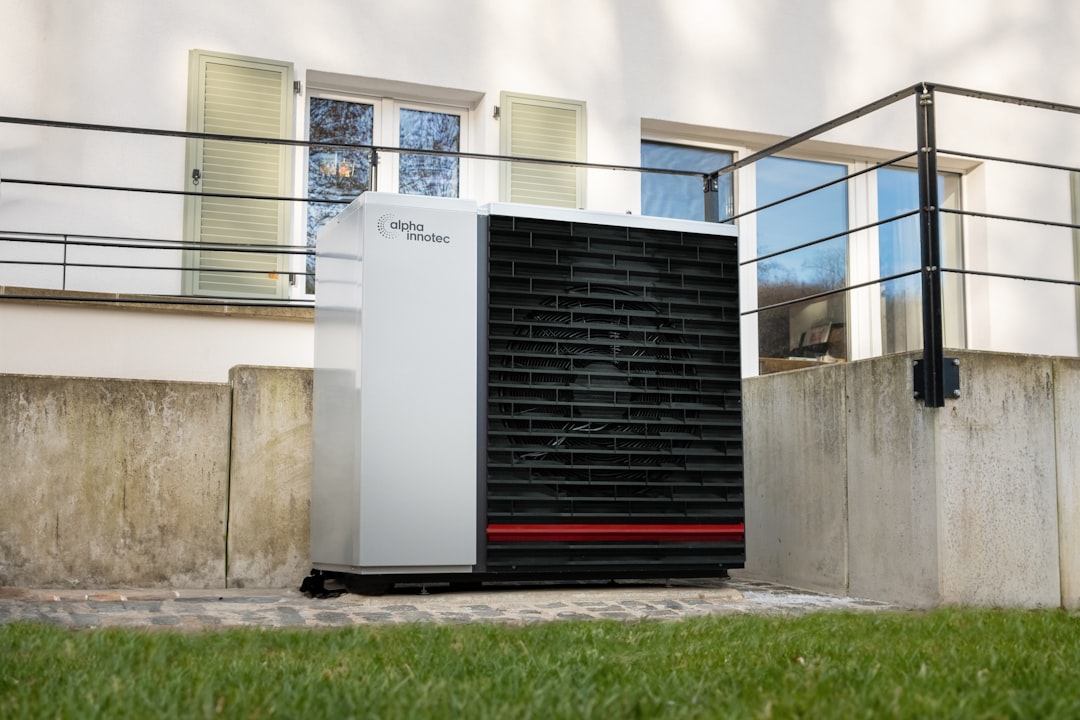
Why AC Compressor Maintenance Protects Your Home's Comfort
AC compressor maintenance is the key to keeping your cooling system running efficiently and avoiding unexpected breakdowns during Southern California's hottest months. Your AC compressor acts as the heart of your air conditioning system, circulating refrigerant through the condenser and evaporator coils to remove heat from your home. Without regular care, this critical component can fail, leading to significant repair or replacement needs.
Quick AC Compressor Maintenance Checklist:
- Turn off power at the breaker box before any maintenance
- Clear debris - Remove leaves, grass, and vegetation within 2 feet of the unit
- Clean condenser fins - Gently vacuum or brush away dirt and straighten bent fins
- Wash the unit - Spray from inside out with gentle water pressure
- Change indoor filters - Replace every 1-3 months during cooling season
- Schedule professional service - Annual inspection to check refrigerant levels and electrical connections
- Watch for warning signs - Strange noises, warm air, or frequent breaker trips indicate problems
The research shows that dirty, clogged filters can reduce airflow and system efficiency significantly, while even small issues like bent condenser fins can force your compressor to work harder than necessary. A well-maintained AC system can last 15 to 20 years, but neglect can cut that lifespan in half. Regular maintenance also helps you catch minor problems before they escalate—a crucial step, as replacement often becomes the more sensible choice when major components fail.
As an experienced HVAC professional helping Southern California homeowners, I've seen how proactive care is always better than dealing with emergency repairs. My hands-on experience has taught me that proper AC compressor maintenance is the best way to ensure a reliable cooling system.
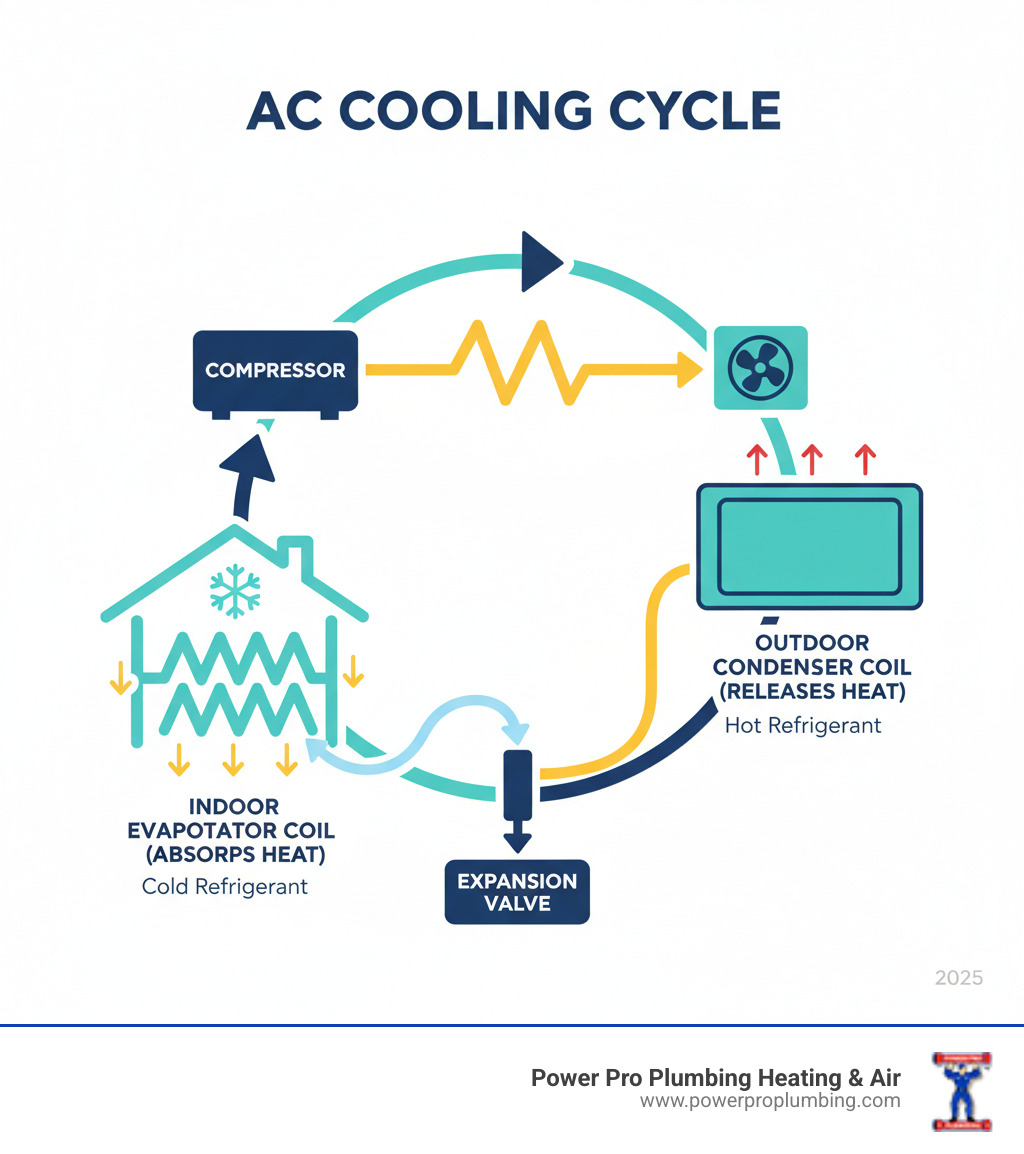
When it comes to maintaining your home's comfort, the outdoor AC compressor unit is a crucial player. It's often out of sight, out of mind, but it works tirelessly to keep your indoors cool. Understanding its function and how to give it a little TLC can significantly extend its life and keep your energy bills from skyrocketing. Let's explore how we can keep this workhorse humming happily.
Your Step-by-Step Guide to Outdoor AC Compressor Maintenance
Before you begin, safety is paramount. Always turn off the power to your AC unit at the breaker box before starting any maintenance. This prevents electrical hazards and stops the unit from accidentally turning on. It's also best to work on a mild day (at least 60°F) so you can comfortably work and test the system afterward.
Next, gather your supplies: gloves, a soft brush, a fin comb for straightening the delicate metal fins, a garden hose with a spray nozzle, and a screwdriver or nut driver for the top grille. A shop vacuum with a brush attachment is also helpful for stubborn dirt.
1. Clear Debris and Prepare the Area
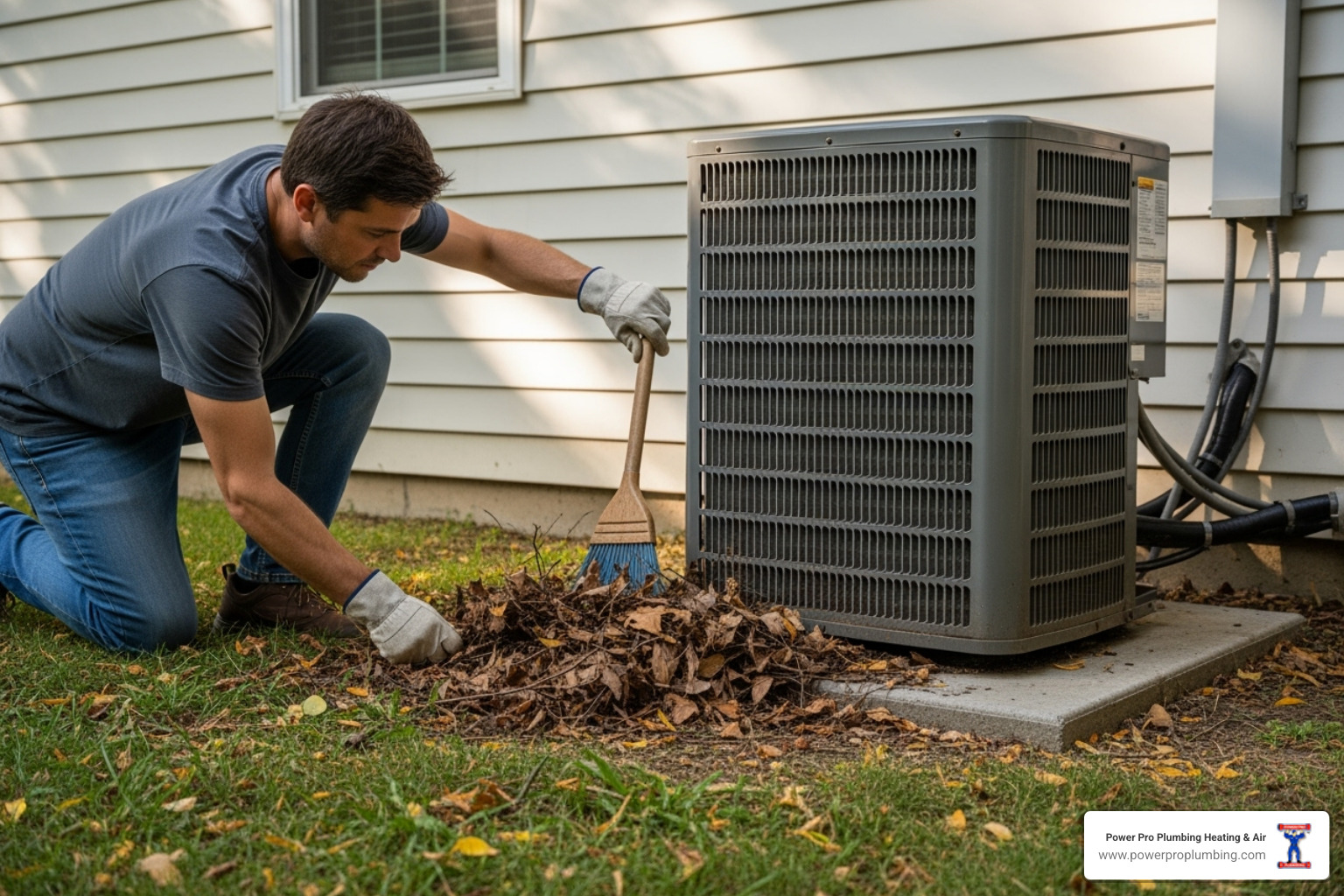
Your outdoor AC unit needs space to work properly. The first step in proper ac compressor maintenance is giving your unit room to breathe. Over time, leaves, grass clippings, and weeds can crowd the unit, blocking the airflow your compressor needs.
Think of it this way: your AC is trying to exhale hot air, but if it's surrounded by debris, it's like breathing through a pillow. The compressor has to work much harder, which drives up your energy bills and wears out the system faster.
Use a soft brush to sweep away any loose debris around the unit. We recommend maintaining at least a two-foot clearance on all sides. Trim back any landscaping that has grown too close. You should also check inside the unit for any nests from birds, rodents, or insects and carefully remove them (with the power still off).
If your unit has a top grille, you'll likely need to remove it with a screwdriver or nut driver to access the interior.
2. Clean the Condenser Fins
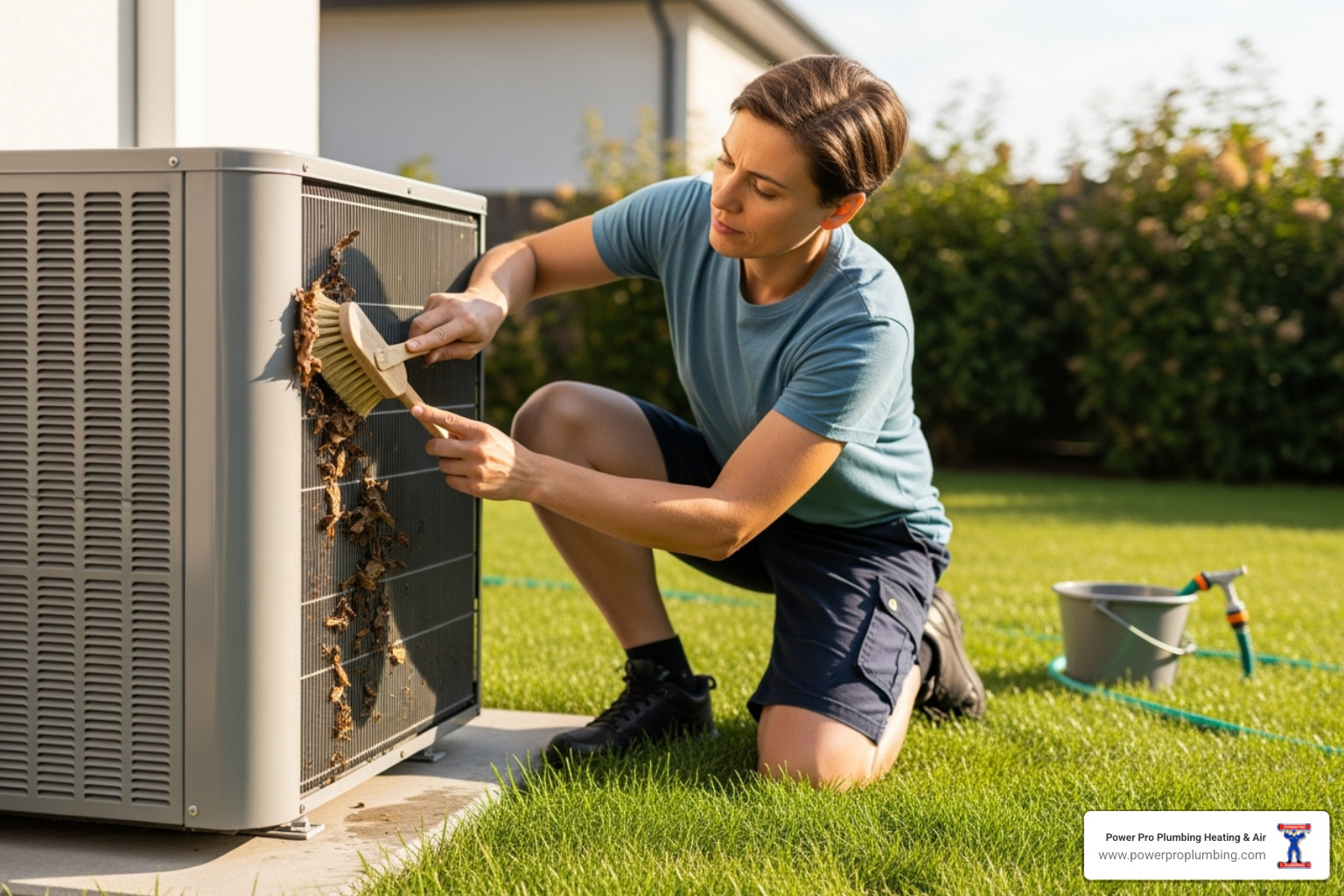
Those thin, metallic strips on your outdoor unit are the condenser fins, and they are critical to your AC's performance. They release the heat that your system pulls from inside your home. When they get clogged with dirt or bent, they can't do their job effectively, and your compressor works overtime.
Start by using a shop vacuum with a soft brush attachment to gently remove dirt and debris from the fins. A whisk broom also works—just be gentle, as the fins are delicate.
Next, inspect the fins for any bent or crushed sections, which can restrict airflow. This is where your fin comb is invaluable. Slide the comb into the bent sections and gently pull to straighten them. The comb's teeth are sized to match the fin spacing. If you don't have a fin comb, a thin butter knife can work in a pinch, but be extra cautious to avoid causing more damage.
This step might seem minor, but it makes a real difference in your system's efficiency. For more guidance on maintaining your air conditioning system, the U.S. Department of Energy offers excellent resources: Air Conditioner Maintenance.
3. Wash the Unit and Reassemble
Now it's time to rinse the unit. With your garden hose on a gentle setting, wash away the loosened dirt. Pro tip: if you've removed the top grille and fan, spray from the inside out. This pushes dirt away from the internal components rather than forcing it deeper inside.
Keep the water pressure gentle. A high-pressure stream can easily bend the fins or force water into electrical components. A steady, gentle spray is all you need.
After rinsing, allow the unit to air dry completely. This is especially important for electrical connections. Rushing this step could cause problems when you restore power.
Once everything is dry, carefully reassemble the fan and top grille, ensuring all screws are secure to prevent rattling. Finally, go back to your breaker box and restore power to the unit. You've just completed essential ac compressor maintenance that will help your system run more efficiently and last longer.
Proactive Care to Extend Your Compressor's Lifespan
Think of AC compressor maintenance as preventive medicine for your cooling system. Consistent care keeps your compressor running smoothly, safeguarding your entire system's efficiency, keeping energy bills in check, and avoiding dreaded summer breakdowns.
A well-maintained AC system can reliably serve your home for 15 to 20 years. Neglect can cut that lifespan in half, leading to premature replacement. The secret isn't complicated—it's understanding that your outdoor compressor doesn't work alone. Everything inside your home plays a role too.
Essential Indoor AC Maintenance
What happens inside your home is just as critical to keeping your compressor healthy.
Changing your air filters is the MVP of AC maintenance. Dirty, clogged filters choke off airflow, forcing your compressor to work overtime. This leads to reduced efficiency, higher energy bills, and accelerated wear. Check your filters monthly during cooling season and replace them every one to three months—more often if you have pets or allergies. If you can't see light through the filter, it's time for a new one.
Inside your air handler, the evaporator coil absorbs heat and moisture. When dirt bypasses a clogged filter, it coats this coil in grime. A dirty coil can't absorb heat effectively, forcing the compressor to run longer. While cleaning this coil often requires professional expertise, keeping your filters clean is your best defense.
Your AC system's condensate drain line removes moisture, but it can get clogged with algae and sludge. A clog can cause water to back up, potentially damaging your home or shutting down your unit. Pouring a cup of distilled vinegar down this line every few months can help prevent clogs.
Your thermostat is the brain of the system. If it's not calibrated correctly, it can cause inefficient cycling that stresses the compressor. Consider upgrading to a programmable or smart thermostat to optimize your AC's operation, saving energy and wear.
For more comprehensive tips on maintaining your entire AC unit, check out this resource: Air Conditioner Unit Maintenance Tips to Keep Your Home Cool All Year.
The Critical Role of Refrigerant
If the compressor is the heart of your AC, refrigerant is the lifeblood. The compressor's purpose is to pressurize and circulate refrigerant, enabling it to absorb heat from inside and release it outdoors.
Your AC system is a closed loop, meaning refrigerant circulates endlessly and isn't consumed like fuel. If your refrigerant is low, it signifies a leak. Low refrigerant forces your compressor to work much harder than designed, leading to overheating and premature wear. Plus, your system won't cool effectively.
Refrigerant leaks are not just bad for your system; they're also harmful to the environment. A professional will always locate and repair a leak before recharging the system. Simply adding more refrigerant without fixing the leak is a temporary fix that wastes money and continues to damage your compressor.
When refrigerant levels drop, the compressor struggles to maintain proper pressure and temperature. This constant strain can quickly lead to mechanical failure.
Handling refrigerant is not a DIY project. It requires specialized tools and knowledge to be done safely and correctly. If you suspect low refrigerant—perhaps your AC is blowing warm air or running constantly—it's time to call in professionals. A trained technician can safely test for leaks, repair them, and recharge your system to the manufacturer's exact specifications.
What are the signs of low refrigerant? Beyond warm air, you might notice ice on the evaporator coil or outdoor copper lines. A hissing or bubbling sound can also indicate a leak. These are all warning signs that your compressor is under stress and needs immediate attention.
Recognizing the Signs of a Failing AC Compressor
Your AC system usually gives you a warning before it completely fails. Catching problems early is key to preventing a catastrophic failure and a much bigger headache. Your AC compressor is built tough, but even the strongest components show signs of wear. Learning to recognize these warnings can make the difference between a straightforward repair and a complete system replacement.
Common Warning Signs
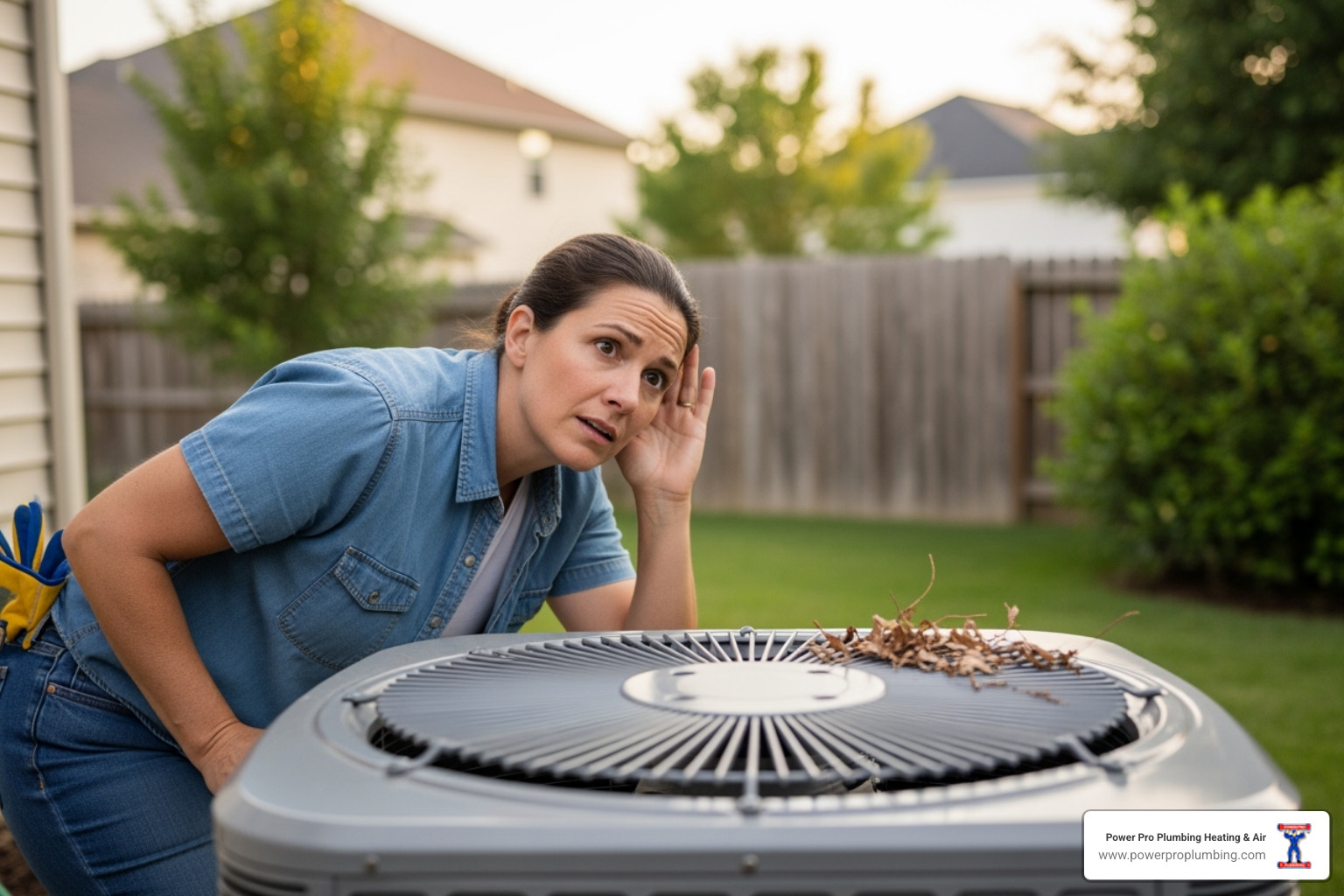
A healthy AC compressor runs with a gentle hum. When your system starts acting up, your ears are often your first line of defense.
Strange noises are a red flag. Grinding, squealing, rattling, or banging from your outdoor unit means something is wrong. Grinding can mean worn bearings, while rattling suggests loose parts. A high-pitched squeal might indicate belt problems, and clicking often points to electrical issues. Don't ignore these sounds—they're your compressor's cry for help.
Blowing warm air is a frustrating sign. If the system is running but your house isn't cooling, the compressor may not be circulating refrigerant effectively. The air from your vents might be lukewarm, defeating the purpose of air conditioning.
Frequent circuit breaker trips indicate that something is drawing too much electricity. A struggling compressor often pulls excessive power to overcome mechanical problems. If your breaker trips repeatedly, it's a sign of a serious issue that needs professional attention.
Fluid leaks around your outdoor unit deserve immediate attention. You might notice oily residue near the unit, which travels with the refrigerant. Any leak means your compressor is losing the lifeblood it needs to function.
Reduced airflow is another telltale sign. If the air from your vents feels weaker than usual, your compressor might not be operating at full capacity. This often happens gradually, so you might not notice it until the problem is severe.
The compressor's job is to compress and circulate refrigerant. When this process breaks down—due to mechanical wear, electrical failure, or refrigerant issues—the whole system suffers. Failed electrical components like capacitors can prevent the compressor from starting, leading to rapid wear and eventual failure.
Repair or Replace? Making the Right Call
When your compressor shows signs of trouble, you face a big decision: repair or replace? We're here to help you think through it clearly.
| Factor | Consider Repair When... | Consider Replacement When... |
|---|---|---|
| Age of AC System | Unit is relatively new (under 10 years old) | Unit is 10-15 years old or older |
| Frequency of Repairs | This is the first major issue | The unit requires frequent repairs |
| Decreased Efficiency | Minor efficiency dips due to simple issues (e.g., dirty coils) | Significant and ongoing drop in cooling performance |
| Warranty Coverage | Compressor is still under warranty | Warranty has expired |
| Overall Condition | Rest of the system (coils, fan, ductwork) is in good shape | Other major components are also showing signs of wear |
| Energy Efficiency | Repair restores original efficiency | New units offer significantly higher SEER ratings and energy savings |
The age of your system matters. If your AC is under 10 years old and this is its first major issue, repair often makes sense. But if your system is approaching 15 years old, replacement is often more economical in the long run.
The frequency of repairs also tells a story. One major repair isn't a deal-breaker, but if you're calling for service every season, your system is showing its age. Continuously paying for repairs on an old system can become frustrating when that investment could go toward a reliable new unit.
Warranty coverage is a key factor. If your compressor is still under warranty, a repair is often the clear choice. Once the warranty has expired, you'll have to weigh the expense of the repair against other factors.
Finally, consider energy efficiency. Today's AC systems are dramatically more efficient than those built 10 years ago. A new system with a higher SEER rating can significantly reduce your monthly energy bills, offering long-term savings.
The bottom line? There's no one-size-fits-all answer. We always provide a thorough assessment and walk you through your options honestly. Sometimes proper ac compressor maintenance can extend your system's life by years, while other times, a new system is the smarter investment. We'll help you make the decision that's right for your home and your budget—no pressure, just straight answers.
Frequently Asked Questions about AC Compressors
Over the years, we've answered countless questions from homeowners about their AC compressors. These two questions come up more than any others, so let's address them directly.
How often should I clean my outdoor AC unit?
We recommend giving your outdoor AC unit a thorough cleaning at least once a year, ideally in the spring before the hot season hits. A quick inspection and light cleaning in the fall can also prepare your unit for winter.
That said, some situations call for more frequent attention. If you live in an area with lots of cottonwood trees or high pollen counts, the condenser fins can get clogged surprisingly fast. Units in heavily wooded areas might need cleaning two or three times during the cooling season. After major storms, it's also wise to check your unit for debris.
Regular seasonal cleaning is one of the simplest and most effective ac compressor maintenance practices. It prevents your compressor from overworking due to restricted airflow, keeps your energy bills reasonable, and can add years to your system's lifespan. A little preventive care in the spring and fall helps you avoid an emergency repair in July.
Can I run my AC with a bad compressor?
This is one question where we have to be firm: no, please don't. We understand the temptation during a heatwave, but running your AC with a failing compressor is asking for trouble.
Here's what happens: First, you risk causing further damage to other components. A failing compressor can send metal shavings through your refrigerant lines, contaminating the entire system. What might have been a repairable issue can escalate into a complete system replacement. Second, a bad compressor can seize up without warning, leaving you with no cooling. Third, and most importantly, a struggling compressor draws excessive electrical current, which can trip breakers or create safety hazards.
If you notice any warning signs we discussed earlier—strange noises, warm air, frequent breaker trips—turn off your system and give us a call. We know it's inconvenient, but early intervention protects your investment and keeps your home safe. We'll diagnose the issue quickly and help you understand your options, whether that's a repair or replacement. Your comfort and safety are worth more than pushing a failing system through one more hot day.
Keep Your Cool with Professional AC Service
You've learned the basics of AC compressor maintenance, and we applaud you for taking these steps to care for your system. However, some aspects of your AC system simply need a trained professional's touch. While you can handle outdoor cleaning and filter changes, critical components and checks require specialized tools and experience.
Regular professional maintenance is an investment that pays dividends. A well-maintained system lasts longer, runs more efficiently, and keeps your energy bills from creeping up. Perhaps most importantly, it gives you peace of mind, so you won't have to worry about a breakdown on the hottest day of the year.
When our technicians visit your home, we go far beyond what's possible with a garden hose and brush. We check refrigerant levels with precision instruments, ensuring your system has exactly what it needs. We inspect every electrical connection for wear or corrosion that could lead to failure. We calibrate thermostats to ensure your system responds accurately. Most importantly, we identify potential issues while they're still small and simple to fix, before they snowball into major emergencies.
At Power Pro Plumbing Heating & Air, we've built our reputation on taking care of homes throughout the greater Los Angeles area—from Azusa to Beverly Hills, Culver City to Duarte, East Los Angeles, and beyond. Our Power Pro Club offers maintenance plans designed to keep your system in peak condition, with scheduled visits that catch problems early. As a Daikin Comfort Pro, we stand behind our work with strong warranties and the highest standards of service. With over 28,573 online reviews, our neighbors trust us to keep their homes comfortable.
Don't wait until your AC compressor is struggling. Let our experienced team ensure your system is ready to handle the weather. Get professional AC service for your Los Angeles home today. We're here to help you stay cool, comfortable, and worry-free all season long.

